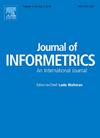七个免费学术数据库的引用次数和参考文献收录情况:比较分析
IF 3.4
2区 管理学
Q2 COMPUTER SCIENCE, INTERDISCIPLINARY APPLICATIONS
引用次数: 0
摘要
本研究的目的是探讨学术数据库之间引用数量的差异以及造成这些差异的原因。研究人员随机抽取了11.5万个Crossref DOIs样本,随后在六个数据库(Dimensions、Google Scholar、Microsoft Academic、Scilit、Semantic Scholar和The Lens)中进行了检索。2021 年 7 月,从每个数据库中提取了引文计数和参考文献列表,以便进行比较处理和分析。研究结果表明,基于 Crossref 的数据库(Crossref、Dimensions、Scilit 和 The Lens)中的出版物具有相似的引用次数,而搜索引擎(Google Scholar、Microsoft Academic 和 Semantic Scholar)中的文档具有更高的引用次数,这不仅是因为出版物的覆盖面更大,还因为整合了网络副本。对参考文献的分析表明,Scilit只能提取具有数字对象标识符(DOI)的参考文献,而Semantic Scholar在添加来自外部网络版本的参考文献时会出现严重问题。研究最终表明,所有数据库都很难为书籍和书籍章节中的参考文献编制索引,这可能是某些学术出版商造成的。研究最后讨论了缺乏引文可能对研究评估产生的潜在影响。本文章由计算机程序翻译,如有差异,请以英文原文为准。
Citation counts and inclusion of references in seven free-access scholarly databases: A comparative analysis
The aim of this study is to examine disparities in citation counts amongst scholarly databases and the reasons that contribute to these differences. A random Crossref sample of >115k DOIs was selected and subsequently searched across six databases (Dimensions, Google Scholar, Microsoft Academic, Scilit, Semantic Scholar and The Lens). In July 2021, citation counts and lists of references were extracted from each database for comparative processing and analysis. The findings indicate that publications in Crossref-based databases (Crossref, Dimensions, Scilit and The Lens) have similar citation counts, while documents in search engines (Google Scholar, Microsoft Academic and Semantic Scholar) have a higher number of citations due to a greater coverage of publications, but also to the integration of web copies. Analysis of references has revealed that Scilit only extracts references with Digital Object Identifiers (DOI) and that Semantic Scholar causes significant problems when it adds references from external web versions. Ultimately, the study has shown that all the databases struggle to index references from books and book chapters, which may be attributable to certain academic publishers. The study concludes with a discussion of the potential effects on research evaluation that may arise from this lack of citations.
求助全文
通过发布文献求助,成功后即可免费获取论文全文。
去求助
来源期刊

Journal of Informetrics
Social Sciences-Library and Information Sciences
CiteScore
6.40
自引率
16.20%
发文量
95
期刊介绍:
Journal of Informetrics (JOI) publishes rigorous high-quality research on quantitative aspects of information science. The main focus of the journal is on topics in bibliometrics, scientometrics, webometrics, patentometrics, altmetrics and research evaluation. Contributions studying informetric problems using methods from other quantitative fields, such as mathematics, statistics, computer science, economics and econometrics, and network science, are especially encouraged. JOI publishes both theoretical and empirical work. In general, case studies, for instance a bibliometric analysis focusing on a specific research field or a specific country, are not considered suitable for publication in JOI, unless they contain innovative methodological elements.
 求助内容:
求助内容: 应助结果提醒方式:
应助结果提醒方式:


